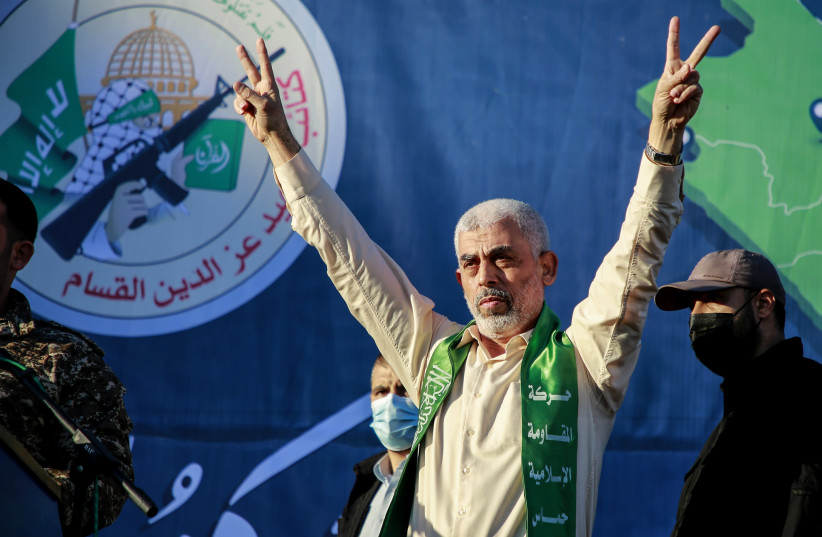Shin Bet Director Ronen Bar on Sunday said terrorist influences from social media algorithms that sensationalize online information are the most complex challenge the Israel Security Agency confronts in defending Israeli democracy.
Bar made the comments at the International Institute for Counter-Terrorism (ICT) conference in Herzliya.
While giving a review of past eras of conventional warfare, the nuclear arms race and physical terrorism, he said the current era has allowed terrorists to reduce the built-in advantage that states normally have against their smaller, detached organizations.
He said terrorists online are able to undermine the commitment of general populations of Western countries to their own nations, as well as to shake up their hold on what is true.
To fight back against these social media terrorist trends, he said, “Information technology must transform into information management.” That would mean committing resources to the technological arena that are large enough to cover all aspects of an intelligence agency.

Bar said Israel must “update its definition of what is considered critical infrastructure. It cannot be that hospitals are not considered critical infrastructure and lack sufficient resources and defenses” to protect them from being hacked.
In addition, he said it is crucial to develop a diverse mix of technological experts in different cyber and other arenas.
These various experts would have to cope with distinct social media threats impacting the Palestinian population as well as other social media threats impacting Shi’ites throughout the region.
“Iran isn’t just a nuclear problem, it is the primary problem of the Middle East.”
Shin Bet chief Ronen Bar
Iran is the Middle East's primary problem
Next, he said, “Iran isn’t just a nuclear problem, it is the primary problem of the Middle East. We can only dream of the level of terror” Iran will be capable of promoting if sanctions against it are removed as part of a return to the JCPOA nuclear deal by the US and the West.
Hamas Gaza chief Yahya Sinwar must choose between rehabilitation versus violence, he said. The terrorist leader must understand that he will be held accountable for all aspects of violence emanating from Gaza or inspired by Hamas even beyond Gaza.
Holding Hamas's Yahya Sinwar responsible for violence
Further, Bar warned that despite the Shin Bet’s new efforts to address potential terrorism within extremist elements of Arab-Israelis inside the Green Line, any new conflict with the Palestinians could lead to new tensions and internal conflict.
All of these multifaceted terrorist threats yielded a significant jump in shooting attacks in 2022 to around 130, up from 98 last year and only 19 in 2020.
He also cautioned that internal conflict between different Jewish sects is a major weakness that Israel’s enemies are trying to exploit.
Bar said that all of Israeli society must rebuild national resilience and tolerance to work together, something the Shin Bet is powerless to do.
What about regional issues?
He expressed hope that recent baby steps in normalization between Israel and the Saudis brought forward during US President Joe Biden’s Middle East trip in July will alter the shape of the region in a way that will make Israel and other arenas more secure.
Earlier at the conference, former Mossad chief and ICT chairman Shabtai Shavit warned that illusions of the spread of democracy through the Arab Spring ended up only being a blip in the predominant and opposite trend of accelerating growth in radical violent Islam.
He said only a unified and sustained global stand on the issue would prevent the wave of radical Islam from overwhelming the West. Currently, such radicalization is wreaking havoc in a dozen African countries.
ICT director Boaz Ganor said a new potential threat was that the top two leaders seeking to take over the leadership of al-Qaeda both have strong ties to Iran.
Ganor said this could risk some kind of multiplying threat with the Islamic Republic providing aid to al-Qaeda in a manner that could increase the Sunni jihadist group’s destructive potential.
US Homeland Security Secretary Alejandro Mayorkas recalled that September 11 was the 21st anniversary of the 2001 tragedy. That attack, he said, altered the American view so that “consciousness of terrorism progressed overnight.” Whereas before 9/11, terrorism was barely on the general public’s radar, now it is viewed as an ever-present threat.
Mayorkas also voiced sympathy with Israel’s constantly being under attack. He expressed disgust at “the horrid photographs of Egged buses bombed and mangled.” He also noted that a “bomb shelter in one’s home is not a new phenomenon for those living in Israel.”
Acting Assistant Director of the FBI Counter-Terrorism Division Kevin Vordran concluded the speeches on Sunday, saying the US had arrested 870 Americans associated with the January 6 “siege” of the Capitol building in Washington, DC.
Further, he said the FBI had elevated racial, ethnic and anti-government crimes to the same level of concern as combating ISIS.
Vordran said this had freed up additional resources to fight these growing problems.
